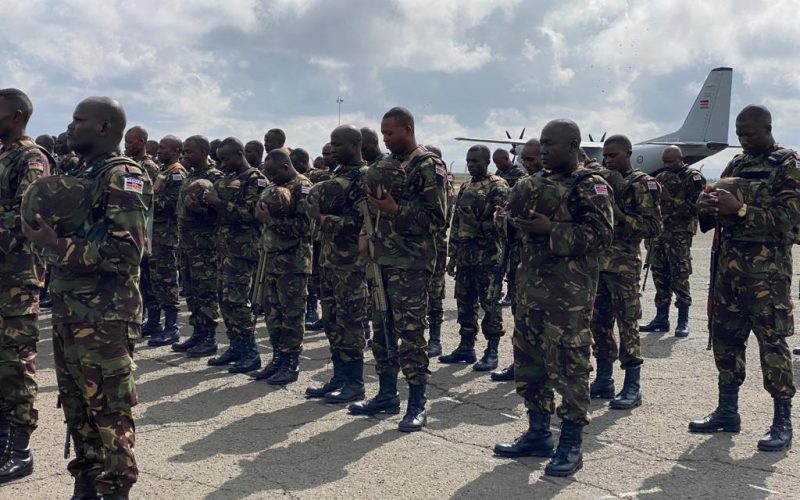First batch of KDF soldiers leave for conflict-prone eastern DR Congo
By Martin Oduor, November 12, 2022
Chief of Defence Forces Robert Kibochi on Saturday, November 12, 2022, flagged off the first batch of Kenya Defence Forces (KDF) soldiers who are being deployed for a peace-keeping mission in the Democratic Republic of Congo (DRC).
Kibochi urged the KDF soldiers to obey the law of the land as they are deployed to Congo.
“I wish you blessings as you are deployed. You are the arrowhead. Make sure you work well with your counterparts,” Kibochi said.
“We are known to follow the law wherever we go. Respect the chiefs of defence where you go,” he added.

Eastern Congo
President William Ruto on September 24, 2022, maintained that the government would deploy KDF troops to the eastern part of the DRC to ease conflict in the region.
DRC, fraught with armed clashes, political instability and human rights violations, has been mired in conflict for decades.
Speaking during an interview with Al Jazeera, Ruto opined that there was a need to stabilise the region since all countries across the East Africa Community (EAC) mutually depend on one another, refuting claims that he was subjecting Kenyan soldiers to a new war despite the aftermath of AMISOM in Somalia.
“The conflict in Somalia is a Kenyan conflict, by and large. The challenges in Eastern DRC are Kenyan challenges. Eastern DRC is served by Mombasa Port, 50% of all imports go through our country, we have a commercial relationship, we are neighbours.
“These are not responsibilities we can run away from…peace in DRC, peace in Somalia, equals to peace in Kenya,” the head of state remarked.
The first-in-command additionally underscored that every country within the EAC had agreed to assist the United Nations (UN) end the conflict by adding soldiers to the 12,000 troops needed to battle the M23 rebels in DRC.
“It is our neighbourhood, we have no choice. We wish this could be done by someone else but if we don’t get involved, it will get worse,” Ruto stated.
He further refuted claims that sending the troops would impose negative repercussions on the country.
“The decision to have the East African Standby Force (EASF) was made in consultation with the UN so there wouldn’t be any possibility of conflict. Kenya is contributing troops to UN Force in DRC but we are also contributing troops to the EASF,” Ruto added.
Ruto also addressed claims that Rwanda is supporting the M23 rebels who are causing havoc in DRC.
Ruto stated: “President Paul Kagame has been forthright that they have nothing to do with M23. There are others who think otherwise. Both Presidents Felix Tshisekedi and Kagame are committed to making sure we solve the problem as a region and that is why all our countries are contributing troops to stabilise that region.”
The Kenyan troops will join others from Uganda, Rwanda, Burundi and Tanzania on the mission in Eastern DRC.
Cost of the mission
Kenyan taxpayers will cough up Ksh4.4 billion to support the KDF troops deployed in the DRC on a peacekeeping mission for a six-month period.
The National Assembly’s departmental committee on Defence, Intelligence and Foreign Relations said the budget for keeping KDF in the DRC could rise to Ksh6 billion if the troops stay beyond the initial six months.
Committee chairperson Nelson Koech told MPs that in the event of a lengthy stay in the DRC, the annual cost of maintaining troops in the country will rise to between Ksh5.5 billion and Ksh6 billion annually.
“In terms of the financial implications of the deployment, the grand total budget stood at Ksh4.45 billion which is Ksh601.87 million above the Ksh3.85 billion in the memorandum to the National Security Council on the matter,” Koech said.
“However, the Cabinet Secretary for Defence explained that the discrepancy emanated from changes effected on the budget after a reconnaissance visit to the area in question that necessitated a change of strategy.”
The expenditures will mainly go towards equipment, operations and payment of sustenance allowances.
The budget presented by the Ministry of Defence has the bulk of the Sh4.451 billion going towards operations and maintenance (Sh1.99 billion), procurement of equipment (Sh1.42 billion) and ammunition (Sh1.03 billion).
Salaries will cost taxpayers (Ksh1.04 billion), sustenance allowance (Ksh1.04 billion), kitting (Ksh80 million), arms (Ksh24.7 million) and major equipment (Ksh286.6 million).
“However, if the Kenyan troops stay for one year, the cost implication will be approximately Ksh7.2 billion. In case the troops stay on, the annual cost implication will be approximately Ksh5.5 billion to Ksh6 billion,” Koech said.
Parliament on November 9, 2022, approved the deployment of the troops along with other forces from the East African region.